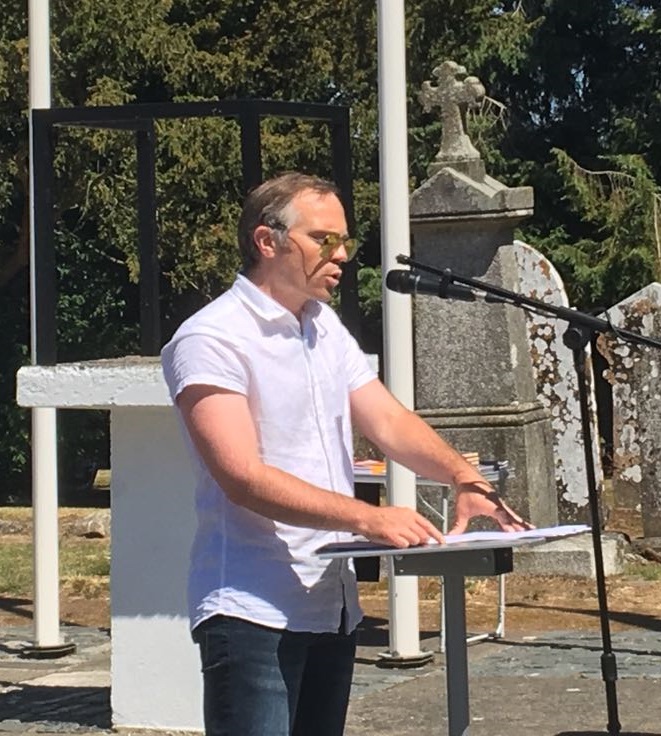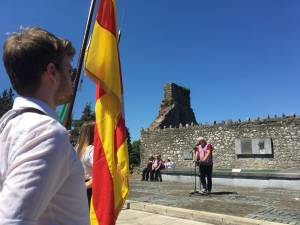The following oration was delivered at the Workers’ Party’s annual Wolfe Tone Commemoration by Gavin Mendel-Gleason, Workers’ Party Ard Comhairle member, Director of Research, and Party representative in Dublin North-West.
Comrades and Friends,
We gather here today at the grave of Wolfe Tone to honour the sacrifice of Wolfe Tone and the United Irishmen, to learn and to think again about the relevance of their secular, anti-sectarian ideas in the modern era, and to reaffirm our commitment as a Party to the republican tradition.
We in the Workers’ Party are proud to trace our ideology back to the founding fathers of Irish republicanism, the United Irishmen, who left us with such a rich legacy of ideas.
While fighting for separation from England, they were not simply Irish nationalists – they were radical egalitarian democrats who saw that freedom would not be handed down from on high. It would have to be fought for by the men and women of no property. The Workers’ Party, as a party of class politics, recognises like Tone and Jemmy Hope that the men and women of no property are the class upon which a new republic can and will be built.
Their belief in secular republicanism, in a free and equal Ireland where false religious divisions would give way to the ‘common name of Irishman’ remains central to the ideology of the Workers’ Party in our battle for a secular, socialist republic. We were proud to play our part in repealing the 8th amendment this year and we will continue to campaign for abortion rights in the north of Ireland, and for the separation of church and state and the construction of a secular state.
We will also continue to build a party that can bridge the sectarian divide and unite workers across the island of Ireland. The bravery and sacrifice of the United Irishmen in building an organisation that crossed religious lines and that sought to implement their republican ideals in the face of a brutal enemy should serve as an inspiration for us today.
It is fitting, therefore, to come to Tone’s graveside to recall the sacrifice that generations of men and women have made for the cause of Irish freedom.
In doing so, it is especially important today that we remember our Comrade May Mac Giolla, who sadly passed away earlier this year. The name May Mac Giolla is a byword for loyalty to the cause. May’s loyalty to the Workers’ Party and to the cause of the socialist republic was unstinting to the end, and today would have marked her 85th Bodenstown commemoration.
The defeat of socialism in Eastern Europe, and the onslaught against the labour movement which began in the 1980s, heralded an era of unfettered liberal individualism which has deemed such loyalty unfashionable, and along with it class politics and the disciplined, working-class party.
But we say that there is no greater cause than that of the Socialist Republic, built by the working class. There is no more effective way of fighting for that cause than by combining together as a disciplined political organisation openly declaring its intention to transform society – the people united through the Party – there is no other path to freedom and equality.
With May’s passing, we have lost a loyal servant of that cause and an invaluable link to the politics of radical republicanism borne of the Dublin working class. But losing May does not meaning losing the politics of socialist republicanism that motivated her. As a Party, we have gained from her knowledge, experience and loyalty, and as a Party, as a collective, we are richer for it and inspired by her sacrifice and her dedication.
As the Party which has led the way in joining republicanism to socialism it is fitting that we also commemorate Karl Marx’s birth which took place 200 years ago this year, only 20 years after the 1798 Rising. It is well known that both the United Irishmen and Marx himself, were strongly influenced by the radical republican movement in France, which abolished the monarchy and established an egalitarian democracy.
Marx not only advocated the overthrow of the monarchies still reigning on the continent and putting republican government in their place, he supported the establishment of an independent Irish Republic. The common thread between the republicanism of Tone and Marx is that of a levelling radical democratic movement, who disdained to respect the great and the good of their era.
But just as in our time, there were those then who laid claim to the mantle of ‘republican’ but who were happy to wine and dine with the financiers and rich of the day. For them, equality did not extend to social equality. In recent years we have seen how the establishment republicans of Fianna Fail and Provisional Sinn Féin are happy to wine and dine with the British monarchy, who remain the primary symbol of privilege and inequality on these islands, and to facilitate American multinationals with a low-wage, low corporate tax economy.
Like Marx we know that in order to create an Irish republic of liberty, equality, and fraternity, it is not enough to simply want it or to use the label. A true Republic must be based on the common ownership of industry for only then would there be no elite capable of exploiting others.
Only the working class has the social position and the material interest to socialise the economy. For Marx, only the working class represent the true interests of the nation because only they can realise the republic through the creation of a publicly owned economy.
Our socialism, then, is not in opposition to republicanism: it is the extension of republicanism; it completes it.
We will not surrender the title of republican to movements motivated by religious and tribal loyalty, or to ones marked by their craven bowing to Wall Street or Westminster.
Marx not only advanced the republican struggle onto an explicitly socialist plane, he pointed out the direction that the struggle must take: a class struggle conducted in a political form. In Ireland this continues to be a valuable lesson where too often republicanism followed a cul de sac of blind militarism and conspiracy.
Since the late 1960s the strategy of our movement has been to build a working class party that organises the people to win the socialist Republic. But a move towards politics means nothing if it is not based on the right principles and the right strategy.
Lenin said that “One of the biggest and most dangerous mistakes made by Communists is the idea that a revolution can be made by revolutionaries alone.”
The party of the working class must not isolate itself from the people.
It cannot prioritise a purity of vision over contact with the people.
The shift towards political action in the late 1960s was accompanied by a realisation that only through involvement in popular struggle could the movement succeed. The hard work in the subsequent decades paid dividends as the Party built up working class support.
In Ireland, the principle radical opposition has been republican. But modern conditions require that the republic be realised as a socialist project. This, in turn, required that the republican movement become fully socialist and merge into the existing labour movement, radicalising that movement and providing it with principled leadership.
The major progress by our Party in achieving this was undone when the opportunists led by de Rossa abandoned the project and split from the Party in 1992. The tragedy was not just the damage done to our Party, but to the the project of merging radical republicanism with working class socialism, the clearest path to winning socialism in Ireland.
Instead, the gates were opened for Catholic nationalists on the one hand and craven Blairites on the other to win political support in working class communities, and the period of untrammelled greed that was the so-called Celtic Tiger was marked by the lack of a working class and socialist opposition of any major size.
But we must be honest with ourselves – we have been unable to recover the momentum that saw the Party build itself into the force that it once was and it is only in recent times that we have stopped the decline. We have become too isolated from the working class while ceding the ground of republicanism to those who are pure and simple nationalists.
In order to recover, we must face up to this failure and reflect on what must be done to put ourselves back on the right path. Our task at this juncture is to build a cadre who understand the historical and strategic importance of radical republicanism in Ireland and the necessity to merge it into working class socialism. At the same time we must expand our efforts to reconnect with the masses so that our ideas, however noble, do not become vague dreams but rather serve as a guide to action and success.
Globally, we have entered a period of political instability. The election of Trump in the United States is a reflection of the growing polarisation of politics, one that is likely to continue.
Living standards for the majority are falling. Housing, access to quality and well paid employment, access to education and health are all increasingly harder to reach for working class and young people.
It is our responsibility as socialists, and as members of the Workers’ Party, to help lead the struggles that will inevitably arise in the coming years as the people fight for a better life and a better society.
Through this work we will be able to educate the people of the need for a socialist republic; we will develop the connections with workers in their communities and in their trade unions which will help us to grow again and to become a powerful force in Irish politics and a voice for the working class.
Building the Party will mean building class consciousness amongst workers and young people. It will mean putting the idea of the socialist transformation of society back on to the political agenda and offering practical alternatives to the people that strengthen the power of the class and point them in the direction of the socialist republic.
This task of reconstructing ourselves is one that can only be achieved through hard work, through dedication and through sacrifice.
That means being involved in the daily struggles of our class and putting the slogan ‘Educate, Agitate, Organise’ into practice.
Comrades and friends, I will finish today with a quote from Comrade Sean Garland, speaking at Bodenstown in 1971, which though written decades ago, once again summarises clearly the task we face as a Party:
‘’The only hope the ruling class has is if it can isolate the revolutionary completely from the rest of the people. That is why the number one task today for those revolutionaries who really want to change the system is to know how to reach people.
We must build a movement of people who are aware and conscious of all the many avenues that are open to the movement; a movement with the realisation that we need to get involved in and build on these issues to that final confrontation with the forces of the establishment.
This will be a long road but if we build our foundations on a conscious people we cannot but succeed.’’



